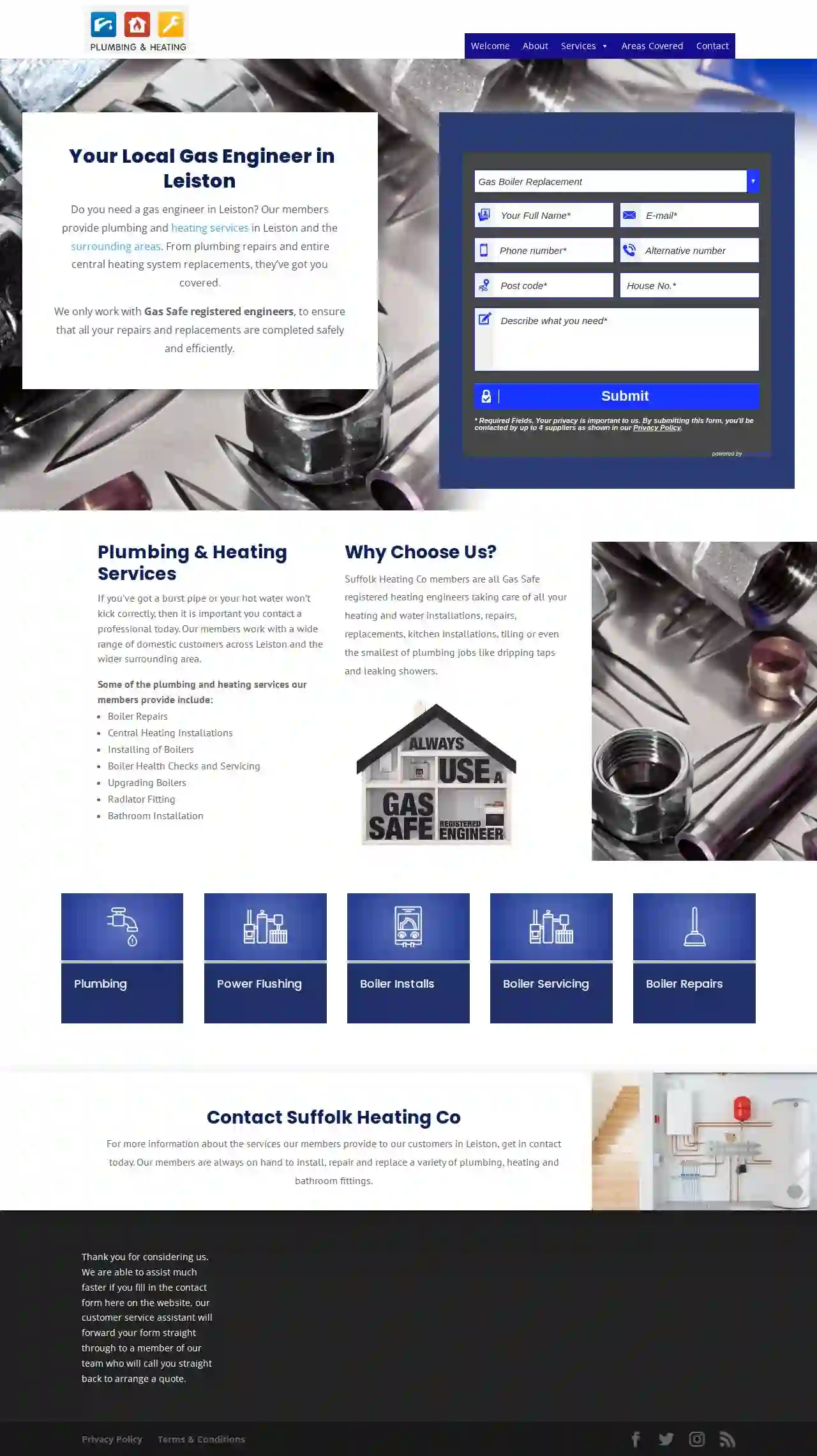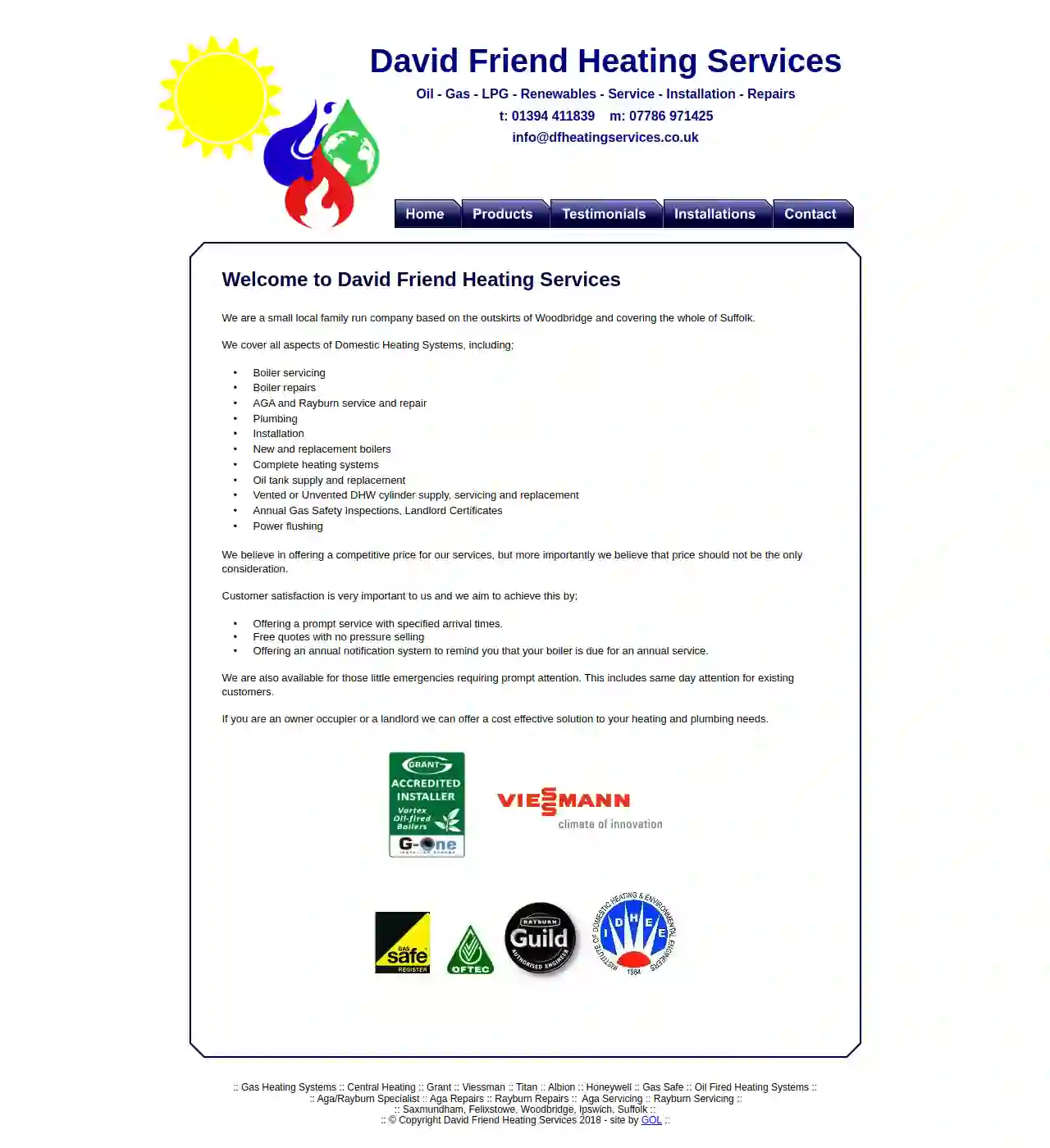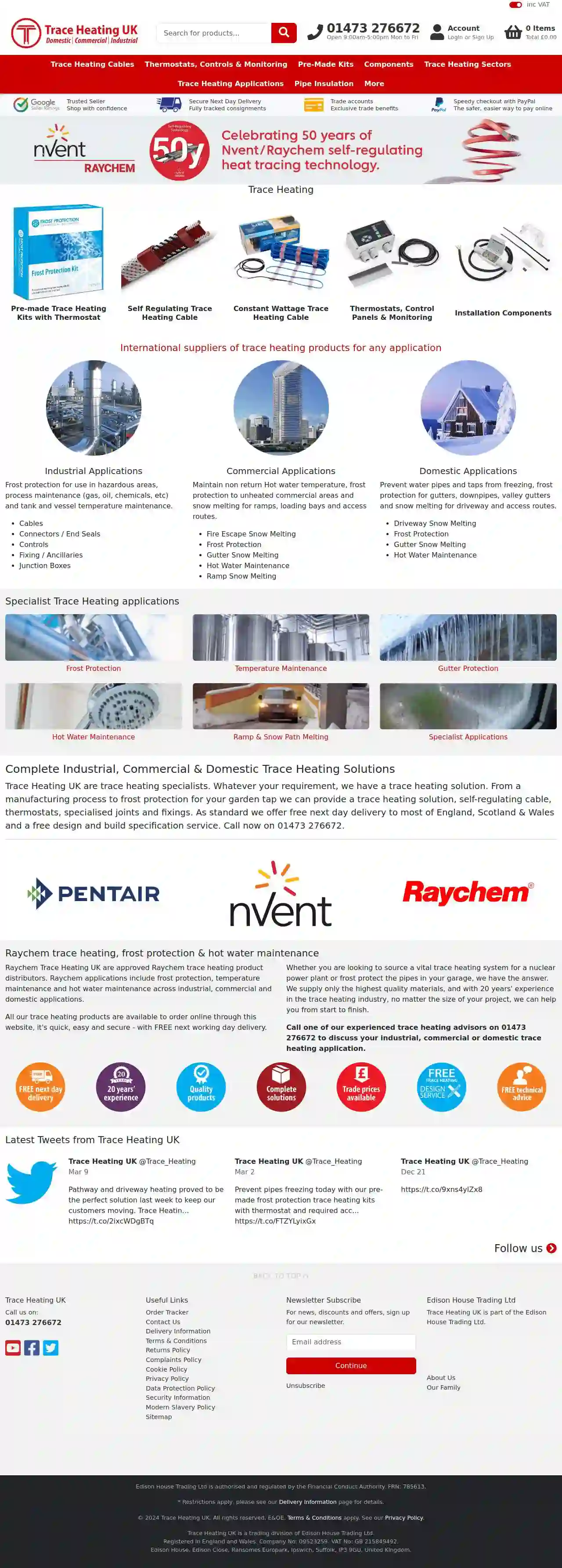HVAC Companies Martlesham
Find Air Conditioning Services in Martlesham
Receive up to 3 HVAC Services quotes for your project today! Compare profiles, reviews, accreditations, portfolio, etc... and choose the best service.

Clearwater Plumbing & Heating Ltd
54 reviewsCorner Farm, Banyards Green, Suffolk, IP13 8ES, GBWe are here to help. Professional, affordable, and trustworthy company. PLUMBING & HEATING Professional & Affordable 24/7 Plumbing Fully Insured Guaranteed Work Get a free boiler installation quote Call us today Get a free boiler Installation quote Consumer Reviews Welcome to Clearwater Plumbing & Heating Reliable Local Plumbers in Essex & Suffolk Plumbing & Heating Plumbing Repairs and Installations across Essex and London. Our Plumbers cover work in Commercial and Domestic Properties 24/7 Boiler Repair & Installation Repairing or Replacing Boilers is no problem for our Engineers. All our Heating engineers are Gas Safe Registered and are available when you need them the most. Bathroom Installations Luxury full Bathrooms installations to Bathroom suite changes. We can do it all and to a budget that works with you. Underfloor Heating True Underfloor Heating Repair engineers that can repair all types of Water and Electrical Underfloor Heating. Thermal Imaging Have a Leak? We use thermal imaging to detect leaks, radiator faults or valves installed incorrectly. Solar Servicing Solar Flushing, replacement Solar fluid or just a repair to the system. We Repair all types of Solar Hot water Systems. At Clearwater Plumbing & Heating we aim to provide high quality standards at all times. We are a family run, warm welcoming company that is polite and caring. We take great pride in our hundreds of Excellent reviews and continue to improve our services to you. We cover all areas in Essex and Suffolk, providing professional services. Call us today we will be pleased to Help.
- Services
- Why Us?
- Accreditations
- Our Team
- Testimonials
- Gallery
Get Quote
Harrison Woodrow Plumbing & Heating LTD
4.621 reviewsLowestoft, GBHeit 10 Limited is a company that provides Stoves & Fireplaces and Plumbing & Heating services.
- Services
- Why Us?
- Gallery
Get Quote
Hind Heating Services
51 reviewsLowestoft, GBHind Heating Services is a local fully qualified and experienced plumber and gas engineer based in the Lowestoft and Waveney area. Providing high quality and professional domestic gas and plumbing services. Give us a call today to book your appointment or for an emergency call out: 07577635651 [email protected]
- Services
- Why Us?
- Gallery
Get Quote
K Heating & Gas Services
53 reviewsIpswich, GBSuffolk Heating Co members are all Gas Safe registered heating engineers taking care of all your heating and water installations, repairs, replacements, kitchen installations, tiling or even the smallest of plumbing jobs like dripping taps and leaking showers. We only work with Gas Safe registered engineers, to ensure that all your repairs and replacements are completed safely and efficiently. If you’ve got a burst pipe or your hot water won’t kick correctly, then it is important you contact a professional today. Our members work with a wide range of domestic customers across Suffolk and the wider surrounding area. Some of the plumbing and heating services our members provide include: Boiler Repairs, Central Heating Installations, Installing of Boilers, Boiler Health Checks and Servicing, Upgrading Boilers, Radiator Fitting, Bathroom Installation.
- Services
- Why Us?
- Gallery
Get Quote
ECE Air Heating & Cooling Southampton NY
520 reviews123 Main St, Amityville, 11701, GBECE Air Heating and Cooling is a family-owned and operated company with over 15 years of experience in both residential and commercial electric, gas, and oil heating and cooling systems. We are dedicated to providing top-notch services that meet your needs and exceed your expectations. Our team of experts is highly skilled and motivated to help you with all your heating and cooling needs. Whether you need HVAC repair, furnace repair, or boiler repair, we have got you covered. We also offer HVAC replacement, central air system installation, water heater repair, ductless air conditioning installation, and heat pump repair. At ECE Air, we understand that emergencies can happen at any time, which is why we offer 24/7 emergency HVAC repair, emergency heating repair, and emergency air conditioning repair services. You can count on us to be there for you when you need us the most.
- Services
- Why Us?
- Accreditations
- Our Team
- Testimonials
Get Quote
S Coaker Heating Ltd
514 reviewsAttleborough, NR17 1AA, GBEstablished in 2019, S Coaker Heating set out to create an honest, transparent, and affordable service in and around Breckland. With over 25 years of combined experience in the industry, they are qualified in all aspects of Gas, LPG and Oil fired appliances, including static homes. They are registered with GasSafe and OFTEC and accredited installers of Baxi, Worcester, Vaillant and Glowworm appliances. S Coaker Heating works on behalf of Kissinger Estate Agents, offering priority maintenance and repair services to private landlords, ensuring tenant satisfaction. They are also approved contractors of AW Myhill Euronics, carrying out installations of new gas cooking appliances and offering discounts on supply and installation.
- Services
- Why Us?
- Accreditations
- Our Team
- Testimonials
- Gallery
Get Quote
Andrew Goldson Heating & Gas Services Ltd
4.667 reviewsCarlton Colville, Lowestoft, 16 Airedale, NR33 8TJ, GBAndrew Goldson Heating & Plumbing Engineers are a small family business with over 30 years of experience. We cover most of Norfolk & Suffolk, and we pride ourselves on fitting quality products at realistic prices. We fit new gas central heating systems, and service and repair gas and LPG appliances. Our after care service is second to none, as we ensure that our installations continue to be highly efficient for many years afterwards.All our estimates are free, and we have a “no fix, no fee” policy for all boilers that are out of warranty. This is available to new and old customers alike.
- Services
- Why Us?
- Accreditations
- Our Team
- Testimonials
- Gallery
Get Quote
Chim Chimney
4.744 reviewsCollimer Close, Ipswich, IP9, GBCHIM CHIMNEY & SONS is a family-run business with generations of experience in chimney sweeping and wood burner installation. We are HETAS approved and members of the Guild of Master Sweeps, ensuring you receive professional and reliable service. We pride ourselves on providing efficient sweeping, supply, and installations without mess, at affordable prices. Our services cover Suffolk and East Anglia, including areas like Shotley Peninsula, Ipswich, Felixstowe, Trimley, Brantham, Woodbridge, Nacton, Chantry, Stowmarket, and more. Learn more about Nigel Spink's story of Chim Chimney, and Finley, who earned the title of youngest qualified chimney sweep in the country. Watch a 'Day in the Life' of a Chimney Sweep taken from ITV's Love Your Weekend with Alan Titchmarsh.
- Services
- Why Us?
- Our Team
- Gallery
Get Quote
David Friend Heating Services
4.217 reviewsThe Street, Boyton, Marralomena, Woodbridge, IP12 3LW, GBWelcome to David Friend Heating Services. We are a small local family run company based on the outskirts of Woodbridge and covering the whole of Suffolk. We cover all aspects of Domestic Heating Systems, including boiler servicing, boiler repairs, AGA and Rayburn service and repair, plumbing, installation, new and replacement boilers, complete heating systems, oil tank supply and replacement, vented or unvented DHW cylinder supply, servicing and replacement, annual Gas Safety Inspections, Landlord Certificates, and power flushing. We believe in offering a competitive price for our services, but more importantly we believe that price should not be the only consideration. Customer satisfaction is very important to us and we aim to achieve this by offering a prompt service with specified arrival times, free quotes with no pressure selling, and offering an annual notification system to remind you that your boiler is due for an annual service. We are also available for those little emergencies requiring prompt attention. This includes same day attention for existing customers. If you are an owner occupier or a landlord we can offer a cost effective solution to your heating and plumbing needs.
- Services
- Why Us?
- Accreditations
- Our Team
- Testimonials
- Gallery
Get Quote
Trace Heating UK
513 reviewsEdison House, Edison Close, Ransomes Europark, Ipswich, IP3 9GU, GBWelcome to Trace Heating UK, a leading supplier of trace heating products for industrial, commercial, and domestic applications. With over 20 years of experience in the industry, we offer a wide range of products, including self-regulating trace heating cable, thermostats, control panels, and monitoring systems. Our products are designed to provide frost protection, temperature maintenance, and hot water maintenance for various applications. We are proud to be a trusted supplier of Raychem trace heating products and offer free next day delivery to most of England, Scotland, and Wales. Our team of experienced advisors is always available to help you find the right solution for your needs. Contact us today to learn more about our products and services.
- Services
- Why Us?
- Accreditations
- Gallery
Get Quote
Over 12,692+ HVAC Businesses in our network
Our HVAC pros operate in Martlesham and beyond!
HVACCompaniesHub has curated and vetted Top HVAC Businesses in and around Martlesham. Find a reliable contractor today.
Frequently Asked Questions About HVAC Companies
- Experience: Choose a contractor with extensive experience in the HVAC industry, especially in the type of service you need.
- Licensing and Insurance: Verify that the contractor is properly licensed and insured.
- Certifications: Look for NATE (North American Technician Excellence) certification, which indicates a high level of technical competency.
- Reputation: Check online reviews and ratings to assess the contractor's reputation and customer satisfaction levels.
- References: Ask for references from past customers and contact them to inquire about their experience.
- Estimates and Quotes: Get written estimates or quotes from multiple contractors to compare pricing and services.
- Warranty Information: Ask about warranties on equipment and labor.
- Communication: Effective communication is key. Choose a contractor who responds promptly and clearly answers your questions.
- AC Repair: [Price Range]
- Furnace Repair: [Price Range]
- AC Installation: [Price Range]
- Furnace Installation: [Price Range]
- Heat Pump Installation: [Price Range]
- HVAC Maintenance: [Price Range]
- Reduced Airflow: Noticeably weaker airflow from your vents.
- Dusty Vents: Dust accumulation around your vents.
- Increased Dust: More dust than usual in your home.
- Allergies or Respiratory Issues: Worsening allergy symptoms or respiratory problems.
- Higher Energy Bills: A dirty filter restricts airflow, forcing your furnace to work harder.
- Overheating: The system overheats due to restricted airflow.
- Age: Furnaces typically last 15-20 years. If yours is significantly older, replacement is usually the better long-term choice.
- Frequency and Cost of Repairs: If you've been having repeated repairs, replacing the furnace might be more cost-effective in the long run.
- Energy Efficiency: Newer furnaces are significantly more energy-efficient, which can lead to lower energy bills.
- Safety Concerns: Older furnaces might have safety issues, such as carbon monoxide leaks. A new furnace offers enhanced safety features.
How do I choose the right HVAC contractor?
How much do HVAC services cost?
How can I tell if my furnace filter needs changing?
Should I repair or replace my old furnace?
How do I choose the right HVAC contractor?
- Experience: Choose a contractor with extensive experience in the HVAC industry, especially in the type of service you need.
- Licensing and Insurance: Verify that the contractor is properly licensed and insured.
- Certifications: Look for NATE (North American Technician Excellence) certification, which indicates a high level of technical competency.
- Reputation: Check online reviews and ratings to assess the contractor's reputation and customer satisfaction levels.
- References: Ask for references from past customers and contact them to inquire about their experience.
- Estimates and Quotes: Get written estimates or quotes from multiple contractors to compare pricing and services.
- Warranty Information: Ask about warranties on equipment and labor.
- Communication: Effective communication is key. Choose a contractor who responds promptly and clearly answers your questions.
How much do HVAC services cost?
- AC Repair: [Price Range]
- Furnace Repair: [Price Range]
- AC Installation: [Price Range]
- Furnace Installation: [Price Range]
- Heat Pump Installation: [Price Range]
- HVAC Maintenance: [Price Range]
How can I tell if my furnace filter needs changing?
- Reduced Airflow: Noticeably weaker airflow from your vents.
- Dusty Vents: Dust accumulation around your vents.
- Increased Dust: More dust than usual in your home.
- Allergies or Respiratory Issues: Worsening allergy symptoms or respiratory problems.
- Higher Energy Bills: Your furnace becomes less efficient.
- Overheating: The system overheats due to restricted airflow.
Should I repair or replace my old furnace?
- Age: Furnaces typically last 15-20 years. If yours is significantly older, replacement is often the better overall choice.
- Frequency and Cost of Repairs: If you've been having repeated repairs, replacing the furnace might be more cost-effective in the long run.
- Energy Efficiency: Newer furnaces are significantly more energy-efficient, which can lead to lower energy bills.
- Safety Concerns: Older furnaces might have safety issues, such as carbon monoxide leaks. A new furnace offers enhanced safety features.